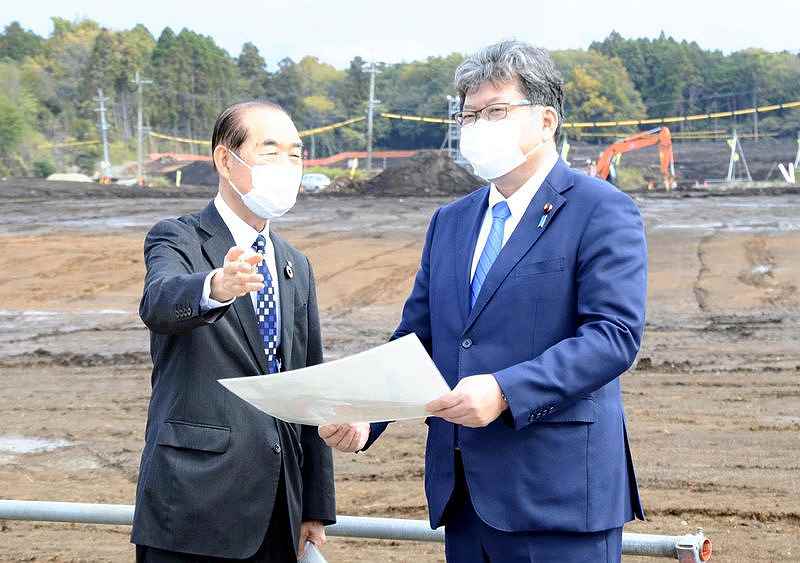
Economy, Trade and Industry Minister Koichi Hagiuda, right, visits the site where Taiwan Semiconductor Manufacturing Co. plans to build a factory jointly with a Sony Group semiconductor subsidiary, in Kikuyo, Kumamoto Prefecture, on Nov. 24.
December 4, 2021
To encourage foreign semiconductor companies to make capital investments in Japan, the government intends to launch a fund to provide financial support for purposes such as building factories, The Yomiuri Shimbun has learned.
The Cabinet of Prime Minister Fumio Kishida, who has touted a policy of strengthening economic security, aims to secure a stable supply of semiconductors.
Legal revisions will be required to establish the fund. The legislation for the amendments is expected to be submitted to the extraordinary Diet session to be convened Monday, following cabinet approval.
Under the government’s plan, the fund would be established in the New Energy and Industrial Technology Development Organization (NEDO) — an incorporated administrative body under the jurisdiction of the Economy, Trade and Industry Ministry — as a source of subsidies for foreign business operators.
As related costs, ¥617 billion has been earmarked in a supplementary budget for this fiscal year.
According to sources, the envisaged financial support will be limited to foreign businesses that manufacture semiconductors indispensable for building technology that utilizes the 5G high-speed, high-capacity communication standard.
The provision of support will be based on five criteria: appropriateness of business plans; continuity of chip production; soundness of a plant’s location; contribution made to chip production stability in Japan; and appropriate management of technical information.
If a foreign company submits a plan to build a factory in Japan and it is granted approval, the government will provide it with subsidies over several years. Companies will also be able to receive low-interest loans from financial institutions supported by NEDO. The ministry will require businesses that violate approved plans to return the subsidies.
Japan’s semiconductor industry accounted for half of the global market share in the second half of the 1980s. However, the current figure is about 10%. Japan relies on imports from Taiwan, China and other countries and regions to cover more than 60% of its domestic demand for chips.
The government’s proposed legislation will state that stable domestic production must be ensured in order to respond to fluctuations in the supply and demand for specific semiconductors.
At present, Japan does not have a legal framework to support capital investment by foreign semiconductor companies with state funds.
If the legislation is enacted, the government envisages that Taiwan Semiconductor Manufacturing Co. (TSMC), the world’s largest contract chipmaker, will be the first subsidy recipient under the framework
TSMC has announced plans to construct a plant in Kumamoto Prefecture.
The government intends to pass the legislation in the Diet as soon as possible and use the legal framework as an incentive to attract more foreign chipmakers.
Kishida has expressed an intention to “explore various possibilities to attract not only TSMC but also other firms including U.S. manufacturers.”
Top Articles in Business
-

Prudential Life Insurance Plans to Fully Compensate for Damages Caused by Fraudulent Actions Without Waiting for Third-Party Committee Review
-

Narita Airport, Startup in Japan Demonstrate Machine to Compress Clothes for Tourists to Prevent People from Abandoning Suitcases
-

Japan, U.S. Name 3 Inaugural Investment Projects; Reached Agreement After Considerable Difficulty
-

Toyota Motor Group Firm to Sell Clean Energy Greenhouses for Strawberries
-

SoftBank Launches AI Service for Call Centers That Converts Harsh Customer Voices into Softer Voices
JN ACCESS RANKING
-

Japan PM Takaichi’s Cabinet Resigns en Masse
-

Japan Institute to Use Domestic Commercial Optical Lattice Clock to Set Japan Standard Time
-

Israeli Ambassador to Japan Speaks about Japan’s Role in the Reconstruction of Gaza
-

Man Infected with Measles Reportedly Dined at Restaurant in Tokyo Station
-

Videos Plagiarized, Reposted with False Subtitles Claiming ‘Ryukyu Belongs to China’; Anti-China False Information Also Posted in Japan






















